QuestionQUESTION: Dear Mick,
I am including the requested info, even though this is about wild box turtles, not my pets. I have been a herp enthusiast since I was a little girl, encouraged by my father. Over the years my family has had "visiting" snakes and turtles that we let go in the exact original location after they were healthy again.
At the moment we only have a 15yo corn snake, from a local breeder. We've had Spot since he was the size of a pencil, just a few weeks old. As he grew so did his homes; he's now in a 55-gallon aquarium, with several hides and eating F/T small rats. Spot is well known in my area as he's gone to several classroom visits plus show-and-tell at various Brownie- and Cub-Scout meetings. He has never been sick, though we do have a reptile vet in Westminster, MD (about 20 mile drive) that we've consulted occasionally, especially in the spring when Spot would rather find a girlfriend than eat. As a Mom, that just makes me crazy! ;)
My question, however, concerns wild box turtles on land that we recently inherited when my mother died this past summer. It is a little less than 10 acres, but part of it, a 4-acre parcel, is at the foot of a mountain. When it was part of my grandparents' farm I remember it as kind of wet; the horse I was riding got stuck in it once when I was a kid. My uncle tells me that each spring that field is "covered" in box turtles.
In order to keep the land some of it has to make money. We're thinking about planting something in that field, to be harvested in the future. I have had a lifelong fascination with bamboo, so that is one option we are considering. The other option is "Christmas" trees.
The other consideration besides disturbing the turtles as little as possible, is that there are a lot of deer around there (South central PA, about 100 miles from my home). Whatever we plant has to be ignored by the deer as well.
Do you see any problems with planting trees or perhaps bamboo in that field? We are very flexible and at the very beginning of any plans. Would the fall be better timing instead of in the spring? Pretty much the planting would be done by hand, with leaving the growing to God.
If this question is outside of your comfort zone, can you recommend a web site or someone else? The money is secondary to the turtles' welfare, if I haven't already made that perfectly clear.
Thank you for your time, and for sharing your expertise on this web site. It is greatly appreciated!
Sincerely,
Linda
ANSWER: Thank you very much Linda, for having enough concern for their conservation to ask about it. It's more than most people would do.
I would like for you to follow up with me, or contact me through my rescue website below, and tell me what general location this property is. That sounds like the area is a very very significant box turtle mating/hatching grounds. It may be of interest to a local herp society or university herpetologist for observation, if you wished to contact someone. As wild box turtle populations are in steady decline all over the south and eastern U.S., this site is no doubt of great importance to supporting wild box turtle populations in your local area.
To be honest, I can't see that there will be a difference if you select to plant an evergreen type tree, or bamboo. Though, bamboo might have less impact on them all around, from planting, to growth, to harvest/falling the crop. Either could actually provide good habitat in the future if these are indeed box turtles. I need to clarify whether these are eastern or western box turtles however. Easterns commonly inhabit wooded and similar humid and foliage covered areas. They provide good hiding spots and food supply for them, as plants will bring worms and other bugs that "boxies" love to dig in the dirt for and eat! As long as it is not cedar, or something else that may be toxic and disliked by turtles and their food sources.
What will matter a great deal is when, how, and where any planting and harvesting is done. Obviously, if you can give them some space in the best part of this mating ground and not disturb the good that is already happening there by itself, it would be better for them. They may migrate from that spot over to an area you plant something in too.
The greatest danger to the turtles will be: late summer/early fall-when eggs are being laid in that soil and baby turtles may be hatching; late fall/winter/early spring-when they will be hibernating perhaps right under the soil you will till. I realize that mid summer is probably not the best time to plant something ;-) If they are disturbed too soon when in hibernation and it is still cold out, it could be a death sentence for them to be caught out in the cold above ground. I'm no expert on bamboo, but we used to have a good stand of it on our land near Houston. It seemed to be very resilient. Perhaps bamboo is more flexible on when it is planted? You may have to see if there is a bamboo expert in the house.
I would recommend that you check back in that area when spring is well under way and search for turtles that may be emerging from hibernation and looking for food or mates in the area. You may have to wait for temperatures to remain steadily above 80F for a few days or more to trigger them to emerge.
Thanks! Great question. Get back to me if you need anything else.
Mick
http://www.freewebs.com/wichitafallsreptilerescue
---------- FOLLOW-UP ----------
QUESTION: Hi Mick,
Thank you VERY much for your answer. It provided some info that I hadn't even thought about, i.e. the turtles' eggs and when they are laid. Looks like the "window of opportunity" for tilling is going to be very small, as you said mid-summer!
I would assume that you can till at one time of the year, then wait for the best time to do the rest. The hole digging and planting is something we're going to try and do by hand.
I have two brothers and sisters; the land was left to all 5 of us. We all have grown kids, and some of them have their own kids, too. This will be a large family endeavor, both because of the amount of work to be done (there will be plenty to go 'round!) but also to make enough noise to keep the bears away. NOT kidding. LOL!
You asked for a general location of where the property is. I'm going to respond to that particular question at your rescue website as I don't want it out there in the public view. No matter how few people might see it, it's never a good idea to give out a location where there are baby box turtles every spring.
I'm assuming you will have a copy of my original question and your answer. Please expect additional information at your website; I'll put "Mick - Allexperts question" in the subject field to identify it as coming from me.
Thanks again!
Sincerely,
Linda
AnswerThanks, Linda.
By general location, I just kinda meant what state you were in. You can contact me at my site though if you want to be more specific.
Anything east of a line from about Texarkana all the way north is going to be eastern box turtles ( Three-Toe, Gulf Coast, and common Eastern species ). In the plains states and westward they are more likely to be western/ornate box turtles. Climate and terrain preferences will be somewhat different, but all box turtles prefer some moisture in the soil during mating and hibernation seasons.

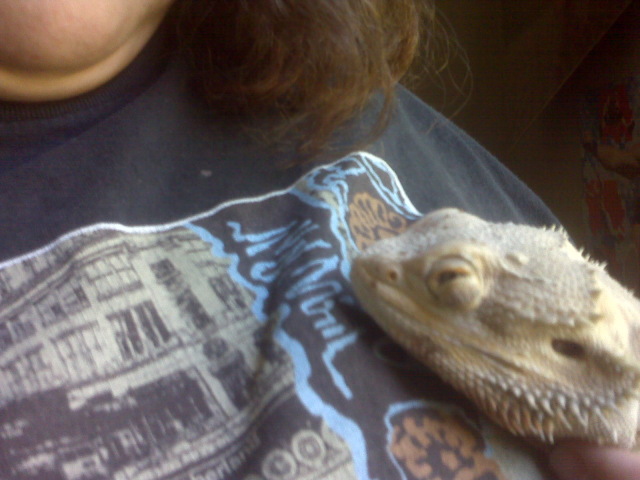 swollen eye on bearded dragon
Questionrockos eye
QUESTION: hello, i got a 2yr
swollen eye on bearded dragon
Questionrockos eye
QUESTION: hello, i got a 2yr
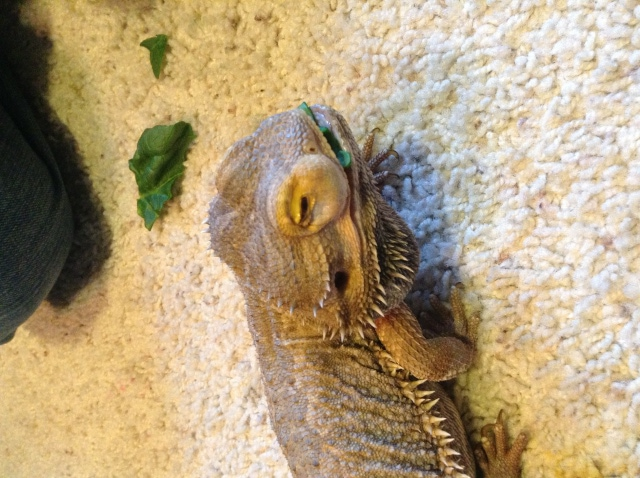 Rex hypovitaminosis A
Question
Rex Rex
This is the picture of hi
Rex hypovitaminosis A
Question
Rex Rex
This is the picture of hi
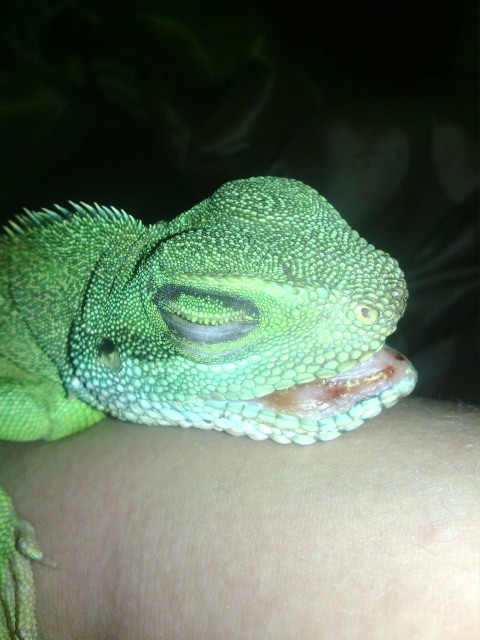 urgent heath question
Question
godzilla godzilla
My sons water d
urgent heath question
Question
godzilla godzilla
My sons water d
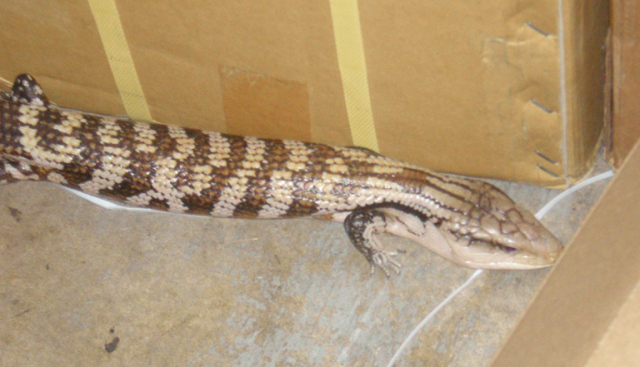 Lizard Indentification
Question
Unknow
Hi Diane,
Thanks for getting back so qu
Lizard Indentification
Question
Unknow
Hi Diane,
Thanks for getting back so qu
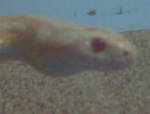 What is wrong
Question
pic of snake
My Husband bought me a albino Cal
What is wrong
Question
pic of snake
My Husband bought me a albino Cal